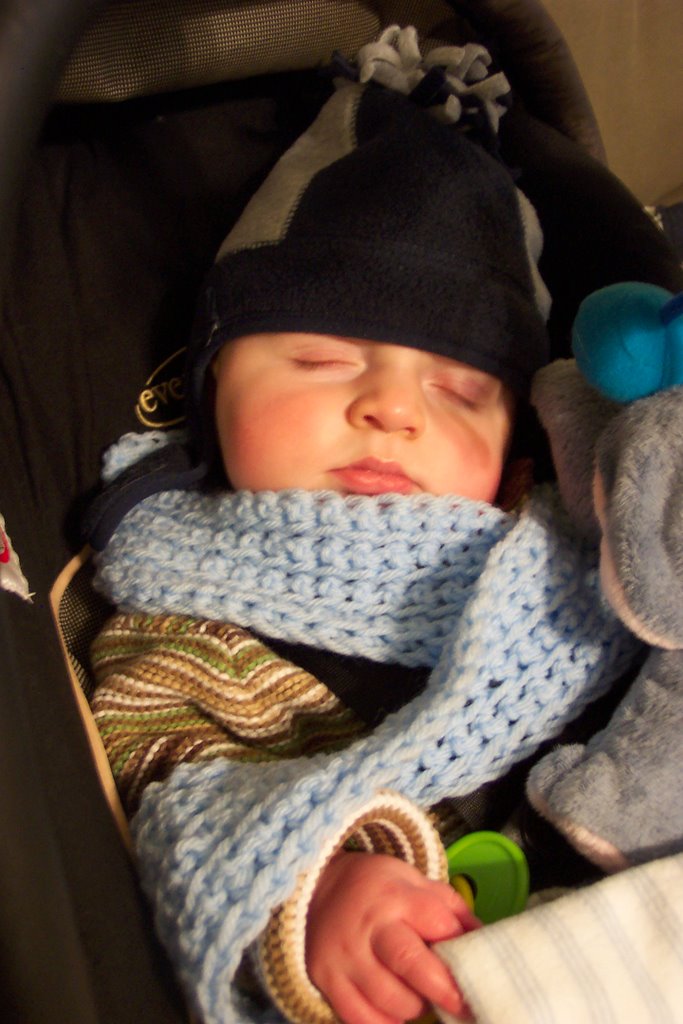A couple of months ago, I began reading quite a few books about speech delays and autism and it seemed very obvious that all of Lewis' symptoms, habits etc. fit those related to autism. It was kind of a relief to finally have an explanation for it all. Lewis' love of spinning objects, selective eating, and difficulty in imitation all are common in autistic children......and I could list a couple dozen more odd behaviors that all fit.
Still, it has been a struggle to consider Lewis' future, and our future together as a family and why God would allow this kind of situation in our lives. After quite a few tears and some pretty angry prayers, we have come to accept it and to trust God to accomplish his purpose in it for all of us. We even have hope that Lewis may learn and achieve somewhat normal function in his life.
About six years ago, I was visiting my sister in Evanston, Ill. when some friends of hers announced at church that their son had been diagnosed with autism. He was two years old at the time, probably about the same age Lewis is now. In tears they asked for the support of the church, specifically through an intensive kind of therapy called ABA (Applied Behavior Analysis). A group of volunteers were trained to do the therapy 20-30 hours per week in their home, and my sister Beth was one of them.
They worked with this child for months and months, and eventually he lost almost all the signs of autism. I've seen him since and talked with him and could tell no difference between him and a normally developing child. Seeing first hand the difference ABA can make in a really young child with autism has helped me to face this head on. I know that great gains are possible. Approximately 50% of autistic kids who start ABA under age 3 eventually become high functioning or indistinguishable from their peers. We have begun pursuing this type of therapy for Lewis.
Unfortunately, it is not common in Kentucky and especially not in Bowling Green. Still, we are hoping to get a home program set up very soon. Basically, this type of therapy is designed to teach skills in small steps to make things easier to learn. Because autistic kids do not imitate actions or speech automatically like normal kids, imitation is taught through rewards (also called reinforcers). As they imitate and are rewarded, they typically become willing to try different and harder tasks, and many even learn to speak this way. Initially, children are forced to imitate simple actions by moving their hands (also called hand over hand) having them go through the motions themselves, until they are able to do it themselves.
Here's an example of something we have taught Lewis recently: Last Christmas Lewis got a book called Dog. This book has pictures of different kinds of dogs with textured things to feel like furry ears, and also pull tabs that make certain dog parts move (a scratching leg, a wagging tail etc.). While reading this book to a group of kids last spring, one child saw me pulling the tabs and immediately began to imitate my actions. That is a normal response. For Lewis, he saw this book read hundreds of times over the months, but would always try to move the animals not by pulling the tabs, but by moving the dog parts themselves. Finally the other day I took his hand and pulled the tabs while reading the book over and over. He didn't begin imitating me in that sitting. The next morning, the book was still laying on the coffee table. When Lewis got up and found the book, he started pulling the tabs all by himself and was so proud that he could do it. It was like he needed time to process this new skill.
Since then we've taught him to use some of his other toys this way too. He definitely has the capacity to learn, we just have to teach him in a way that makes sense to him and allows him to succeed in smaller steps than other children.
This has gotten really long, and I apologize! But we want to make it clear that we feel so blessed to have Lewis in our lives. We love him just the way he is and would not trade him for the world. On the flip side, we are expecting the next few years to be particularly challenging in trying to free him from the autistic behaviors that sidetrack him and keep him from learning. In that aspect we will need the prayers and support of as many as are willing. If you are interested in learning more about autism and ABA here a few books we recommend:
- Let Me Hear Your Voice by Catherine Maurice
- Facing Autism by Lynn Hamilton
- Louder Than Words by Jenny McCarthy (this one has quite a bit of profanity, just to warn you! Her perspective and feelings are some I relate to very much as a mom so I will still recommend it.)















